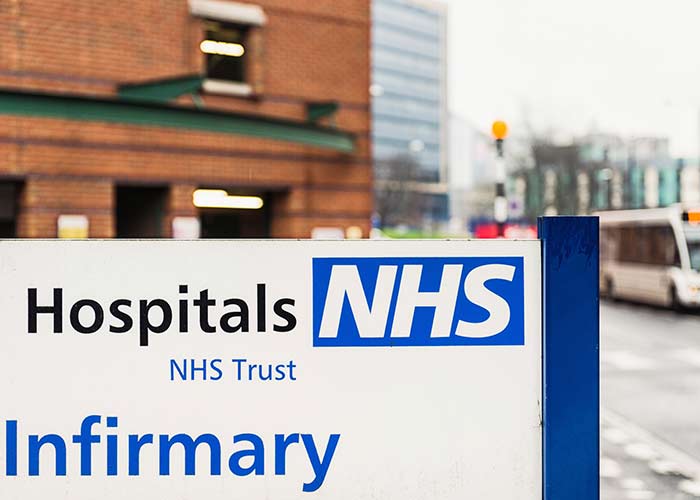
The government has published its long-term plan for the NHS in England with welcome ambitions to improve care in cancer, maternity and mental health.
To achieve these aims there is extra investment – an annual increase of 3.4% a year over and above inflation for the next five years – this will see NHS funding increase by £20.5 billion in 2023/24. This is a large cash injection by any measure, especially against a backdrop of GDP growth forecasts hovering around 1.5% a year.
But while the NHS cash injection is substantial, the sad reality is that it’s also the bare minimum needed to keep pace with growing demand from an expanding, ageing and chronically ill population. The Health Foundation and IFS project that the NHS would need annual increases of 3.3% above inflation just to arrest falls in quality and access to care, and 4% to make improvements.
If the extra funding is to make any inroads into the UK’s health outcome gap with comparable countries, the extra funding will need to be used very wisely.
As has been reported, the Treasury is clearly worried. Extra health funding can all too often seem like pouring water onto sand. It wants assurances that the money will deliver the improvements promised and has set a productivity target of 1.1% a year. This target will be make or break; without productivity gains the NHS would need around £10 billion of further funding in 2023/24 just to stand still – that’s equivalent to around 1p extra on employee and employer NI contributions.
In recent years the NHS has had a good story to tell on productivity. The latest data from ONS shows that in 2017, health care productivity grew by 3% – substantially above both performance across the economy as a whole and the long-run trend for the NHS. A target of 1.1% a year might therefore seem unambitious, but much of the productivity growth in recent years has come from one-off events which can’t be repeated. For example, big blockbuster drugs such as statins for high blood pressure reached the end of their patent life and the NHS reduced pressure on the drugs budget by switching to cheaper, generic alternatives.
Scratch below the surface however and there are real questions about the sustainability of productivity improvements.
The volume of inputs (staff, buildings, goods and services bought from suppliers) grew very modestly last year to drive up headline productivity. Those in the service are having to work ever harder to keep services running. All too often productivity gains are being delivered despite national policy failures; from capital budgets routinely raided to prop up day to day running costs, to poor workforce planning and variable management, all acting as barriers to using skilled staff optimally.
'The NHS needs a new approach to productivity but this week’s NHS plan is still a long way from a coherent plan to raise productivity on a sustained basis.'
The NHS needs a new approach to productivity but this week’s NHS plan is still a long way from a coherent plan to raise productivity on a sustained basis.
The NHS is in many regards no different to other sectors of the economy. It needs a well-functioning labour market to supply enough staff with the right skills. It needs access to capital for buildings and equipment, and effective investment in R&D. But it then needs an incentive and managerial framework that ensures these resources are used well.
The NHS long-term plan recognises that workforce shortages will be a major barrier to delivery. There is a gap of 100,000 staff this year, projected to grow to around 250,000 in a decade’s time. The result is clogged up A&E departments, delayed or cancelled operations, high staff turnover and wards staffed with temporary workers. England needs to train more staff if it is to break this cycle. The plan recognises this but can’t make firm commitments as funding for the pipeline of doctors and nurses is to be decided in the 2019 Spending Review.
The same is true for capital investment which is also for the Spending Review. The plan sets out sensible proposals to shift care upstream from hospitals to the community, transform the use of technology in-line with the IT revolution in other sectors, and improve cancer care through earlier diagnosis. But all of this will require capital funding, which has been repeatedly raided to fund day to day running costs. Earlier diagnosis of cancer requires investment in MRI and CT scanners – the UK has less than half the OECD average number per head.
The NHS is searching for a financial framework which will help shift investment from the rescue end of services towards more prevention and early intervention. Having spent 30 years trying to introduce a financial framework that mirrors classic competitive markets, the plan confirms that the NHS has moved beyond a market based approach. But while the NHS knows it doesn’t want a market, the alternative is still inchoate.
Paying hospitals for each episode of care at a nationally set price to encourage them to do more and do it more cheaply will be reduced, and in place of this will be more use of budgets for whole populations – planning is back. Mimicking the market has delivered only modest gains and undoubtedly increased fragmentation, but the history of block budgets is not encouraging; too often it leads to unresponsive services and low productivity growth.
More fundamentally, the focus on financial flows fails to address the core task central to improving productivity; engaging and supporting clinicians to consistently adopt best practice. The NHS has begun to get leading clinicians to understand how the quality and cost of care varies. Unwarranted variation is a big problem in health care. The NHS prizes innovation and recognises the achievement involved.
It doesn’t value the adoption of innovation by others enough – we laud the trailblazer not the follower. Yet consistently improving productivity requires a much greater focus on the rapid and effective diffusion of best practice. In the private sector, competition is the engine of diffusion – firms need to shape up or they ship out. If competitive pressures are reducing within the NHS – what is the alternative? Much weight is placed on new technology but less fashionably, the research shows that good management really matters. That’s a very hard political sell.





















